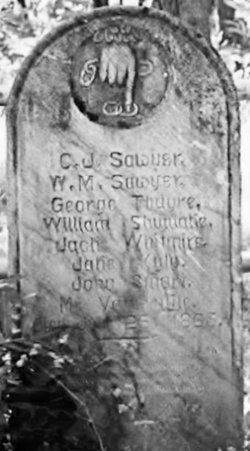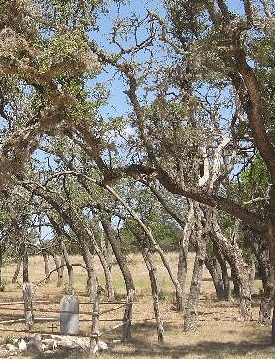Several days afterward Maj. Alexander and his men came through Bandera, on trail of the men, and went from here to Hondo. Picking up the trail there, they followed it to Squirrel Creek, some 10 miles beyond Hondo, where they discovered the men they were seeking in camp. They had finished their noonday meal, and were quietly resting, some lounging around and talking, others attending to the stock, not suspecting that they were being pursued and at that very moment in danger of being captured. Approaching under cover within a very short distance of where the men were camped, Maj. Alexander stepped out into an opening and, swinging his saber over his head, called upon them to surrender, telling them he had them surrounded and there was no chance for escape, and if they would quietly submit he would pledge his word that they should have a fair trial by court-martial at Camp Verde.
The little party of nine promptly yielded up their arms, and were then forced to saddle their horses and immediately start back toward Camp Verde. All went evenly enough until the second night on the return trip, when, while in camp on the Julian some of Alexander's men wanted to hang the prisoners.
Some of the party refused to have any thing to do with the execution, but some were determined to put the prisoners out of the way, and accordingly marched them out some distance from camp and hung them one by one. A hair rope was used in hanging these men, and each one died by strangulation, being drawn up until choked to death. When life was extinct the victim was let down, and the rope cut, leaving the noose still about his neck. Bill Sawyer, one of the victims begged to be shot, saying he preferred that manner of death to being hung. His wish was granted, and some one in the party fired a rifle at him which only produced a flesh wound on his arm. Sawyer fell, but when it was found that he had not been fatally shot, another man placed the muzzle of his gun against the fallen man and shot him through the body with a full charge, leaving the ramrod in the gun, which went through him and into the ground. He was thus found the next day. They boy in the party, a lad about 16 years old, is supposed to have escaped, but he, too, may have been murdered, as he was never heard of again.
From A Bandera County Tragedy By J. Marvin Hunter, published 1924
Possibly John S. Smart, born about 1838 in Missouri, who appears in the 1860 Federal Census for Williamson County, Texas living in the household of Bell Smart.
Several days afterward Maj. Alexander and his men came through Bandera, on trail of the men, and went from here to Hondo. Picking up the trail there, they followed it to Squirrel Creek, some 10 miles beyond Hondo, where they discovered the men they were seeking in camp. They had finished their noonday meal, and were quietly resting, some lounging around and talking, others attending to the stock, not suspecting that they were being pursued and at that very moment in danger of being captured. Approaching under cover within a very short distance of where the men were camped, Maj. Alexander stepped out into an opening and, swinging his saber over his head, called upon them to surrender, telling them he had them surrounded and there was no chance for escape, and if they would quietly submit he would pledge his word that they should have a fair trial by court-martial at Camp Verde.
The little party of nine promptly yielded up their arms, and were then forced to saddle their horses and immediately start back toward Camp Verde. All went evenly enough until the second night on the return trip, when, while in camp on the Julian some of Alexander's men wanted to hang the prisoners.
Some of the party refused to have any thing to do with the execution, but some were determined to put the prisoners out of the way, and accordingly marched them out some distance from camp and hung them one by one. A hair rope was used in hanging these men, and each one died by strangulation, being drawn up until choked to death. When life was extinct the victim was let down, and the rope cut, leaving the noose still about his neck. Bill Sawyer, one of the victims begged to be shot, saying he preferred that manner of death to being hung. His wish was granted, and some one in the party fired a rifle at him which only produced a flesh wound on his arm. Sawyer fell, but when it was found that he had not been fatally shot, another man placed the muzzle of his gun against the fallen man and shot him through the body with a full charge, leaving the ramrod in the gun, which went through him and into the ground. He was thus found the next day. They boy in the party, a lad about 16 years old, is supposed to have escaped, but he, too, may have been murdered, as he was never heard of again.
From A Bandera County Tragedy By J. Marvin Hunter, published 1924
Possibly John S. Smart, born about 1838 in Missouri, who appears in the 1860 Federal Census for Williamson County, Texas living in the household of Bell Smart.
Family Members
Advertisement
Records on Ancestry
Advertisement












